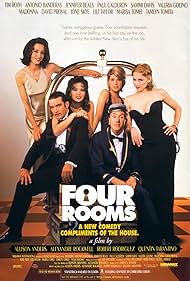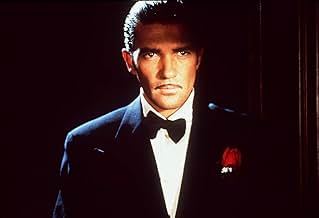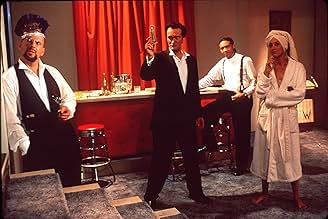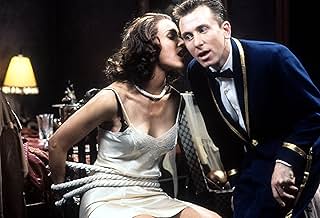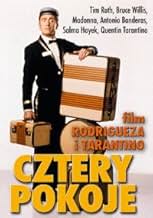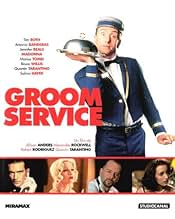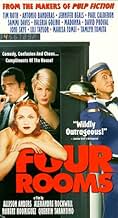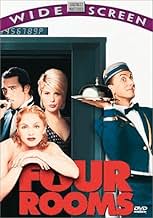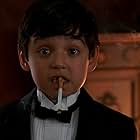Four interlocking tales that take place in a fading hotel on New Year's Eve.Four interlocking tales that take place in a fading hotel on New Year's Eve.Four interlocking tales that take place in a fading hotel on New Year's Eve.
- Awards
- 1 win & 1 nomination total
Amanda De Cadenet
- Diana (segment "The Missing Ingredient")
- (as Amanda deCadenet)
Patricia Vonne
- Corpse (segment "The Misbehavers")
- (as Patricia Vonne Rodriguez)
Featured reviews
8ck-7
I really don't understand why this movie got such bad reviews! Overall, this is a creative and refreshing movie. It is not Pulp Fiction but it is still a good performance. Tim Roth, especially, is the best thing in the film. Out of the four I like Robert Rodguize's misbehavior the best. The missing ingredient was indeed a bit cheesy but the rest are still above average performance. If you are interested in this movie but discouraged by the movie critics, I ensure you that you won't regret seeing it.
Four Rooms was concocted like one of those many, many collaborative efforts from directors in the 60's and 70's (i.e. The Witches, Ro.Go.PaG, Boccaccio '70, etc), except this would revolve around a bell-hop on New Years Eve. It disqualifies itself as being any kind of masterpiece or classic in independent film-making, and sometimes the filmmakers (Alison Anders, Robert Rodriguez, and Alexandre Rockwell, and Quentin Tarantino, the last two also serving as executive producer) look like they're relishing too much in their (limited) clout and exuberance to concentrate. As was with many others who viewed the film, I found that the first two segments were the lesser ones, and the last two were the best ones. It all comes down, in this case, to which two were funnier. So, let's break each one down:
Allison Anders' film is a quirky, quasi-lesbian take on a coven of witches, featuring the likes of Madonna and Lily Taylor, are the first to shake up (perhaps for the better in this one) Ted the bell-hop. Ted, by the way, is played with a continuous, nervous-type of fervor that goes from being innocuous, to annoying, and then acceptable again. It's also interesting to see how his character goes through different motions when under each director (for example, in Rodriguez's film he's more of a cartoon-type of character, and in Tarantino's film he hearkens slightly to his previous collaborations with the director, quieter, on edge in a particular way). Some of the laughs are surrounded by a kind of attitude put forth by the director that seems a little off. Maybe I'm the wrong audience for it, though- the women in the audience may appreciate it, or rather amused by it, more than I. I give it a B-
Alexandre Rockwell's The Wrong Man is my least favorite of the bunch, as Ted gets stuck with a couple of crazed fetishists (David Proval and Jennifer Beals). The problem here lies with two things- the fact that the comedic timing/chemistry is a little iffy/off with the three actors, and that the writing doesn't come off like it's naturally funny. When Beals' character Angela runs off about Ted's private parts, this could be funny, but it's more 'ho-ho' than 'ha-ha' to me. Some of the tension from Roth brings some laughs, but not enough to compensate the uncomfortable atmosphere around the whole segment. I give it a C-
The third segment, The Misbehaviors, displays how clever and quick Rodriguez can be with physical comedy (slapstick) as well as in getting laughs from kids (as he did here and there in his Spy Kids movies). It is also a boost that the whole segment comes off as though it's like a live-action Looney Tunes short- it's so ridiculous that in some scenes I burst out laughing (i.e. Ted's reaction to the corpse). The set-up with the parents was also amusing in how Banderas and Tamlyn Tomita act towards the kids. Then the pay-off knocks it out of the park. Grade: A
Then we come to the closure, featuring the indie wunderkind at the time, Tarantino, as he takes on two sources of inspiration- Rohald Dahl's "Man from the South" short story, later translated through Alfred Hitchcock's television show. It's a smart, hip little piece of Hollywood satire from Tarantino, as he himself plays an overly obnoxious Hollywood filmmaker, with two guys by his side (Paul Calderon and Bruce Willis), as they take a gamble right after the stroke of midnight. It took me a couple of time to watch this to really get into it, but when I did it was even more promising. The camera-work in the scene (via 'Dogs' and 'Pulp' cinematographer Andrzej Sekula) is deliberately paced, and it's perfectly leisurely for the pace of the last segment. That much, if not all, of the dialog is funny it's because of the skill and chemistry between the four of them. Plus, a little prologue with Marisa Tomei and Kathy Griffin gives the indication of what insanity is in store. Grade- A.
So, is this film a success? For it's time, I'm not sure. With the power of four million off the success of each director's previous efforts (Tarantino with 'Dogs', Rodriguez with El Mariachi, Anders with Gas, Food, and Lodging, and Rockwell with In the Soup, all from the 92 Sundance place), they did whatever they wanted, and it's not the success it could've been. On the other hand, when one looks at the films in perspective, it could've been a lot worse, and it wasn't. At the least, it works as one of the quintessential party movies for fans of the 90's "new-wave" crop.
Allison Anders' film is a quirky, quasi-lesbian take on a coven of witches, featuring the likes of Madonna and Lily Taylor, are the first to shake up (perhaps for the better in this one) Ted the bell-hop. Ted, by the way, is played with a continuous, nervous-type of fervor that goes from being innocuous, to annoying, and then acceptable again. It's also interesting to see how his character goes through different motions when under each director (for example, in Rodriguez's film he's more of a cartoon-type of character, and in Tarantino's film he hearkens slightly to his previous collaborations with the director, quieter, on edge in a particular way). Some of the laughs are surrounded by a kind of attitude put forth by the director that seems a little off. Maybe I'm the wrong audience for it, though- the women in the audience may appreciate it, or rather amused by it, more than I. I give it a B-
Alexandre Rockwell's The Wrong Man is my least favorite of the bunch, as Ted gets stuck with a couple of crazed fetishists (David Proval and Jennifer Beals). The problem here lies with two things- the fact that the comedic timing/chemistry is a little iffy/off with the three actors, and that the writing doesn't come off like it's naturally funny. When Beals' character Angela runs off about Ted's private parts, this could be funny, but it's more 'ho-ho' than 'ha-ha' to me. Some of the tension from Roth brings some laughs, but not enough to compensate the uncomfortable atmosphere around the whole segment. I give it a C-
The third segment, The Misbehaviors, displays how clever and quick Rodriguez can be with physical comedy (slapstick) as well as in getting laughs from kids (as he did here and there in his Spy Kids movies). It is also a boost that the whole segment comes off as though it's like a live-action Looney Tunes short- it's so ridiculous that in some scenes I burst out laughing (i.e. Ted's reaction to the corpse). The set-up with the parents was also amusing in how Banderas and Tamlyn Tomita act towards the kids. Then the pay-off knocks it out of the park. Grade: A
Then we come to the closure, featuring the indie wunderkind at the time, Tarantino, as he takes on two sources of inspiration- Rohald Dahl's "Man from the South" short story, later translated through Alfred Hitchcock's television show. It's a smart, hip little piece of Hollywood satire from Tarantino, as he himself plays an overly obnoxious Hollywood filmmaker, with two guys by his side (Paul Calderon and Bruce Willis), as they take a gamble right after the stroke of midnight. It took me a couple of time to watch this to really get into it, but when I did it was even more promising. The camera-work in the scene (via 'Dogs' and 'Pulp' cinematographer Andrzej Sekula) is deliberately paced, and it's perfectly leisurely for the pace of the last segment. That much, if not all, of the dialog is funny it's because of the skill and chemistry between the four of them. Plus, a little prologue with Marisa Tomei and Kathy Griffin gives the indication of what insanity is in store. Grade- A.
So, is this film a success? For it's time, I'm not sure. With the power of four million off the success of each director's previous efforts (Tarantino with 'Dogs', Rodriguez with El Mariachi, Anders with Gas, Food, and Lodging, and Rockwell with In the Soup, all from the 92 Sundance place), they did whatever they wanted, and it's not the success it could've been. On the other hand, when one looks at the films in perspective, it could've been a lot worse, and it wasn't. At the least, it works as one of the quintessential party movies for fans of the 90's "new-wave" crop.
I seem to recall that when "Four Rooms" came out, it was critically and commercially derided. When I saw it a few months later, I actually thought that it was pretty well done. I knew that Quentin Tarantino was involved in the making, so I could safely assume that there was an element of sleaze in the movie.
Well, the movie is likely to blow anyone away, just in terms of how far they go. Portraying bellhop Ted (Tim Roth) and his loony experiences on New Year's Eve while waiting on several people in a hotel, they blow everything out of the water. The first two segments are pretty lowbrow: the first one portrays a witches' coven and the second one portrays a psychopath who thinks that Ted had sex with his wife.
But when we get to the third segment, that's where the movie really takes off. Ted has to watch the children of a slick Mexican guy named Man (Antonio Banderas). After a few incidents, Man comes back and finds the room in the most mind-blowing scene imaginable. And, the last segment. Ted, in a totally frenetic state, goes to a room where several Hollywood guys are having a discussion (with as many curse words as possible). What happens at the end of that segment...well, let me just tell you that no one sees that coming! All in all, people who think that the movie didn't go anywhere obviously missed the point. I don't know for certain whether this movie was just an excuse to be crazy, but it sure seemed like that. You're sure to have fun watching it. Also starring Madonna, Valeria Golino, Jennifer Beals, Salma Hayek, and even Quentin Tarantino in the final segment playing a Hollywood type.
Well, the movie is likely to blow anyone away, just in terms of how far they go. Portraying bellhop Ted (Tim Roth) and his loony experiences on New Year's Eve while waiting on several people in a hotel, they blow everything out of the water. The first two segments are pretty lowbrow: the first one portrays a witches' coven and the second one portrays a psychopath who thinks that Ted had sex with his wife.
But when we get to the third segment, that's where the movie really takes off. Ted has to watch the children of a slick Mexican guy named Man (Antonio Banderas). After a few incidents, Man comes back and finds the room in the most mind-blowing scene imaginable. And, the last segment. Ted, in a totally frenetic state, goes to a room where several Hollywood guys are having a discussion (with as many curse words as possible). What happens at the end of that segment...well, let me just tell you that no one sees that coming! All in all, people who think that the movie didn't go anywhere obviously missed the point. I don't know for certain whether this movie was just an excuse to be crazy, but it sure seemed like that. You're sure to have fun watching it. Also starring Madonna, Valeria Golino, Jennifer Beals, Salma Hayek, and even Quentin Tarantino in the final segment playing a Hollywood type.
"Four Rooms" is far more entertaining than you would expect from its generally negative reviews. Which is not to say that any of it is a masterpiece but if you enjoyed "Love American Style" on television and are not put off by a raunchy take on that anthology concept you should make an effort to view this film. Each story is taking place in a different room of a hotel the same night. It was made between the time Tarantino made "Pulp Fiction" and worked on "Dusk Till Dawn" with Rodriquez. Many in the large cast are Tarantino and Rodriquez regulars. Here are a few of the reasons to watch each of the four stories:
"The Missing Ingredient" - Madona has simply never looked better and her "come get me" dress will burn your eyeballs. Alicia Witt plays her stock alienated teen and delivers sarcasm as only she can.
"The Wrong Man" – Alexander Rockwell directed this segment shortly after directing "In the Soup" so he already knew how to get the most out of Jennifer Beals. Her diatribe about Ted's sex organ is a cinema classic.
"The Misbehavers" – Rodriquez directs his favorite actor Antonio Banderas in something that is a throwback to classic Laurel and Hardy. Not only do his two kids misbehave when left alone in their hotel room, but their misbehavior is so comprehensive that the closing shot reveals a room of total anarchy. It is wonderful slapstick on a huge scale, with comic timing worthy of the Laural and Hardy and the Marx Brothers.
"The Man From Hollywood" – This has the best script with Tarantino reserving the best stuff for his own character. He even reprises the "tasty beverage" line from "Pulp Fiction. Beals has already found her way to this room by the time bellboy Roth arrives and she delivers more good lines. I was impressed that Tarantino built up his suspense "before" the contest began and then did not try to extend the suspense but ended things on the first attempt.
The best bit in the whole film might be Roth's phone call to his boss. Marisa Tomei answers the phone in a room full of comatose post-New Years Eve partygoers. She then does a version of her "My Cousin Vinnie" expert witness routine, this time concerning types of handguns. In the foreground the entire time are the only other conscious (but totally stoned) inhabitants of the room. They are playing against each other in a video game. One just stares in stunned fascination at the screen, holding the controller but not using it as the other player maniacally manipulates his controller throughout the entire phone conversation.
"The Missing Ingredient" - Madona has simply never looked better and her "come get me" dress will burn your eyeballs. Alicia Witt plays her stock alienated teen and delivers sarcasm as only she can.
"The Wrong Man" – Alexander Rockwell directed this segment shortly after directing "In the Soup" so he already knew how to get the most out of Jennifer Beals. Her diatribe about Ted's sex organ is a cinema classic.
"The Misbehavers" – Rodriquez directs his favorite actor Antonio Banderas in something that is a throwback to classic Laurel and Hardy. Not only do his two kids misbehave when left alone in their hotel room, but their misbehavior is so comprehensive that the closing shot reveals a room of total anarchy. It is wonderful slapstick on a huge scale, with comic timing worthy of the Laural and Hardy and the Marx Brothers.
"The Man From Hollywood" – This has the best script with Tarantino reserving the best stuff for his own character. He even reprises the "tasty beverage" line from "Pulp Fiction. Beals has already found her way to this room by the time bellboy Roth arrives and she delivers more good lines. I was impressed that Tarantino built up his suspense "before" the contest began and then did not try to extend the suspense but ended things on the first attempt.
The best bit in the whole film might be Roth's phone call to his boss. Marisa Tomei answers the phone in a room full of comatose post-New Years Eve partygoers. She then does a version of her "My Cousin Vinnie" expert witness routine, this time concerning types of handguns. In the foreground the entire time are the only other conscious (but totally stoned) inhabitants of the room. They are playing against each other in a video game. One just stares in stunned fascination at the screen, holding the controller but not using it as the other player maniacally manipulates his controller throughout the entire phone conversation.
It's impossible to analyze this film without breaking it down into its four segments for separate comment. It would also be improper, since it was not intended to be anything less than an anthology from four notable independent filmmakers: Alexandre Rockwell, Alison Anders, Robert Rodriguez, and Quentin Tarantino.
The first episode is exactly the sort of thing that someone in a high school drama production would want to do, but can't get away with in a high school drama production. It's juvenile, unfunny, and lifeless, but it has the (pointless) nudity and lines of dialogue like:
Witch #1: "I am your mother."
Witch #2: "Then why are we sleeping together?"
that sound like the screenwriter is giggling and thinking, "I can't believe I'm getting away with this! I'm so clever!"
Nothing is at stake in the first episode; it's generally expected that a story must have conflict in order to BE a story. This has none. Just some half-baked jokes and a pair of topless women (If I wanted that, I'd skip renting a movie and go out instead.)
Second episode is a hair better, but you'll find yourself crying "Why doesn't Ted the Bellboy do [insert plot resolution here] and get the bloody hell out of there!" When it finally does end, you're disheartened to find that it had no reason to exist. Two snips with a pair of scissors, a bit of tape, and we wouldn't know the difference. Roll opening credits, go straight to the Rodriguez segment.
Third episode has some structural support to keep it from caving in on itself. The surprise in the middle (I won't give it away, don't worry) is horrifying enough to give the segment some heft. Rodriguez and his d.p., Guillermo Navarro, move it along dexterously and (as usual) have a good handle on visual comedy.
The last segment is the best. I think it's safe to say that Quentin Tarantino has, officially, never disappointed me as a director or screenwriter. My heart leapt as soon as I heard his trademark dialogue coming from the lips of Marisa Tomei as "Four Rooms" segued from "The Misbehavers" to "The Man From Hollywood." I wasn't sure if his take on Ted the Bellhop's misadventures was going to be any good, but I knew that if he wrote it and helmed it, it wasn't going to be all bad.
What a pleasant surprise (still just talking about the fourth segment here). This part of the movie, with its ridiculous premise (lifted form an old Hitchcock episode, which it acknowledges out loud), moves along speedily, and the actors take to it as naturally as any other movies by Q.T. Basically playing himself, Tarantino is hilarious. If anything, he knows A) how people really act when they're drunk (i.e. not like Dudley Moore caricatures) B) why people think he's so obnoxious, like a real-life, fast-talking Jar Jar Binks and C) how to put some bang in his visual storytelling. It's low-rent Tarantino, don't get me wrong, but it's also the best part of "Four Rooms."
All in all, the first film I've ever seen that starts out with a loathsome, horrifying badness, gets incrementally better with each passing fifteen minutes, and ends as good as one would like. Just don't make me watch it again.
The first episode is exactly the sort of thing that someone in a high school drama production would want to do, but can't get away with in a high school drama production. It's juvenile, unfunny, and lifeless, but it has the (pointless) nudity and lines of dialogue like:
Witch #1: "I am your mother."
Witch #2: "Then why are we sleeping together?"
that sound like the screenwriter is giggling and thinking, "I can't believe I'm getting away with this! I'm so clever!"
Nothing is at stake in the first episode; it's generally expected that a story must have conflict in order to BE a story. This has none. Just some half-baked jokes and a pair of topless women (If I wanted that, I'd skip renting a movie and go out instead.)
Second episode is a hair better, but you'll find yourself crying "Why doesn't Ted the Bellboy do [insert plot resolution here] and get the bloody hell out of there!" When it finally does end, you're disheartened to find that it had no reason to exist. Two snips with a pair of scissors, a bit of tape, and we wouldn't know the difference. Roll opening credits, go straight to the Rodriguez segment.
Third episode has some structural support to keep it from caving in on itself. The surprise in the middle (I won't give it away, don't worry) is horrifying enough to give the segment some heft. Rodriguez and his d.p., Guillermo Navarro, move it along dexterously and (as usual) have a good handle on visual comedy.
The last segment is the best. I think it's safe to say that Quentin Tarantino has, officially, never disappointed me as a director or screenwriter. My heart leapt as soon as I heard his trademark dialogue coming from the lips of Marisa Tomei as "Four Rooms" segued from "The Misbehavers" to "The Man From Hollywood." I wasn't sure if his take on Ted the Bellhop's misadventures was going to be any good, but I knew that if he wrote it and helmed it, it wasn't going to be all bad.
What a pleasant surprise (still just talking about the fourth segment here). This part of the movie, with its ridiculous premise (lifted form an old Hitchcock episode, which it acknowledges out loud), moves along speedily, and the actors take to it as naturally as any other movies by Q.T. Basically playing himself, Tarantino is hilarious. If anything, he knows A) how people really act when they're drunk (i.e. not like Dudley Moore caricatures) B) why people think he's so obnoxious, like a real-life, fast-talking Jar Jar Binks and C) how to put some bang in his visual storytelling. It's low-rent Tarantino, don't get me wrong, but it's also the best part of "Four Rooms."
All in all, the first film I've ever seen that starts out with a loathsome, horrifying badness, gets incrementally better with each passing fifteen minutes, and ends as good as one would like. Just don't make me watch it again.
Storyline
Did you know
- TriviaThe reason Bruce Willis is not credited is because he violated SAG rules for acting in this film for no money. He appeared for fun and as a favor to Quentin Tarantino, and acting for free violated SAG rules. SAG agreed not to sue Willis if his name was not included in the credits.
- GoofsWhen Ted leaves the room with the married couple, his hair is visibly shorter than when he was in the room.
- Quotes
Angela: Whether you like it or not, you are in the middle of a situation here you cannot just wish your way out of.
Ted the Bellhop: But I've never met you people before! You're complete strangers!
Angela: Everybody starts out as strangers, Ted. It's where we end up that counts.
- Crazy creditsBruce Willis does not apear in the credits but his hairstylist does
- Alternate versionsAs indicated in the Technical Specifications link for this page on IMDB, there are two different versions of this film: "1 hr 38 min (98 min)" and "1 hr 50 min (110 min) (workprint)". Information on the workprint is as follows: "[The] second version is in English but it is overdubbed with Russian. This makes it almost impossible to work out what is extra as the Russian is much louder than the English and therefore the English cannot be heard for the majority of the movie. I have done some research and have been told that it is impossible to remove the Russian audio. The disc also contains a deleted scene from the Spanish DVD that is an alternate take, not used in either the DVD Version or the Workprint."
- ConnectionsFeatured in Cinemania: Ypalliloi en drasei! (2009)
- SoundtracksSentimental Journey
Written by Bud Green, Les Brown, Ben Homer
Performed by Juan García Esquivel (as Esquivel)
Courtesy of The RCA Records label of BMG Music
Details
- Release date
- Country of origin
- Official site
- Language
- Also known as
- Cuatro habitaciones
- Filming locations
- Production companies
- See more company credits at IMDbPro
Box office
- Budget
- $4,000,000 (estimated)
- Gross US & Canada
- $4,257,354
- Opening weekend US & Canada
- $427,733
- Dec 25, 1995
- Gross worldwide
- $4,257,354
Contribute to this page
Suggest an edit or add missing content

